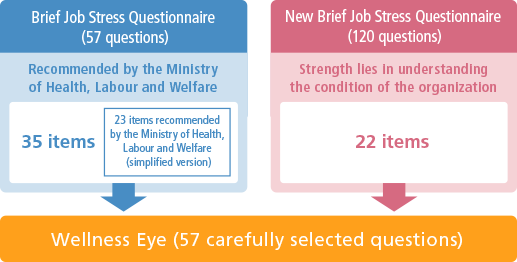Questions in Wellness Eye
The number of questions was carefully selected through industry-academia joint research with Professor Norito Kawakami of The University of Tokyo and responds to legislation and more.
1Response to legislation
The questions cover the “Brief Job Stress Questionnaire (23 items in the simplified version)” and fully respond to laws that make the Stress Check mandatory.
2Enhancement of group analysis
The items of the “New Brief Job Stress Questionnaire” which are highly effective for understanding the condition of the organization are adopted.
3Focus on user convenience
The number of questions is minimized to reduce the burden of taking the check.
Profile of Supervisor
Professor Norito KawakamiGraduate School of Medicine, The University of Tokyo Mental Health
A leading researcher in “occupational mental health,” a field of mental health research in which he has been engaged for about 30 years. Actively involved in training experts and industry-academia joint research and development, etc. to solve increasingly diverse mental health issues
Positions
- President, Japan Society for Occupational Health
- Director, Japan Society for Occupational Mental Health
- Director, Japanese Society of Behavioral Medicine
- Director, The Japanese Association of Stress Science
- Director, The Japan Association of Job Stress Research
Career Summary
- 1981
- Graduated from School of Medicine, Gifu University <obtained medical license>/dd>
- 1985
- Completed doctoral program at Graduate School of Medicine, The University of Tokyo (major in social medicine) <obtained Doctor of Medicine degree>
- 1985
- Assistant at Faculty of Medicine, The University of Tokyo (public health course)
- 1990
- Visiting Researcher at The University of Texas School of Public Health (behavioral sciences)
- 1992
- Assistant Professor at School of Medicine, Gifu University (public health course)
- 1999
- Developed Job Stress Assessment Diagram at the research group of the former Ministry of Labour
- 2000
- Professor at Medical School, Okayama University (hygienics course)
- 2006
- Professor at the School of Public Health, The University of Tokyo (Department of Mental Health)
- 2011
- As a representative of the scientific research group at the Ministry of Health, Labour and Welfare, developed “Scientific Evidence-based Guidelines for Primary Prevention of Occupational Mental Health Problems” and prepared the “New Brief Job Stress Questionnaire”
- 2014
- Participated in the Study Group on Stress Check Items, Etc. of the Ministry of Health, Labour and Welfare
- 2017
- Participated in the MHLW’s Study Group on Measures to Prevent Power Harassment at Workplace
- 2019
- Awarded Koseki-sho, or “Meritorious Contribution Award” by the Minister of Health, Labour and Welfare of Japan
- 2020
- Awarded Shiju-hosho, or “Medal of Honor with the Purple Ribbon”
